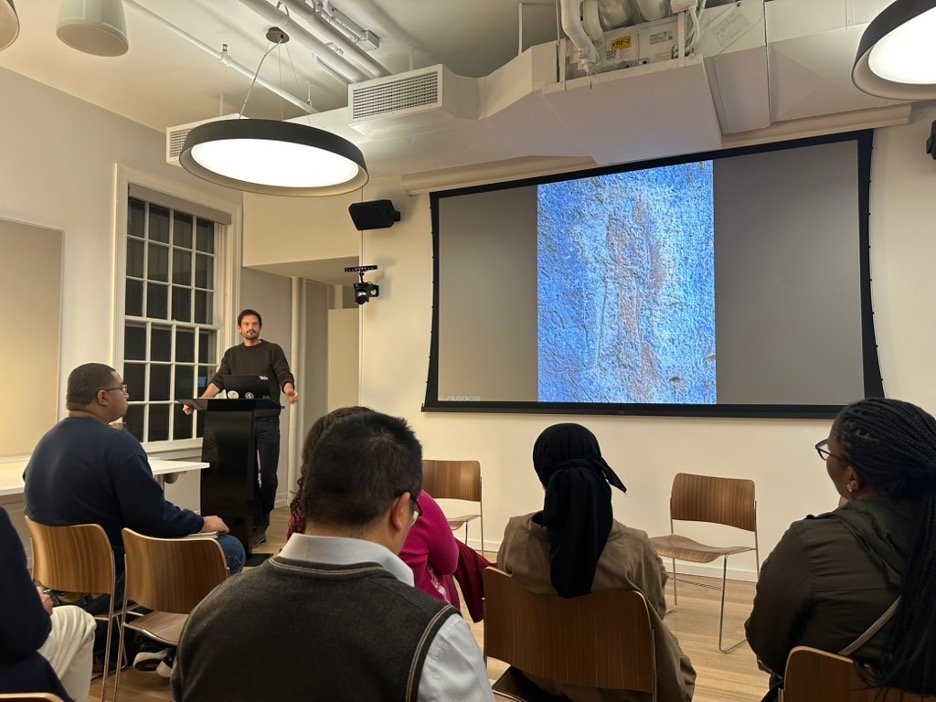Yale World Fellow Leon McCarron explores Iraq’s ‘Wounded Tigris’
On Nov. 11, award-winning writer and adventurer Leon McCarron spoke at Yale’s Middle Eastern and North African Cultural Community about his journey along the Tigris River.

Zeyna Malik, Contributing Photographer
Can a river that birthed civilizations survive the emergence of modern challenges?
This concern was at the heart of Yale World Fellow Leon McCarron’s lecture on Monday. Drawing from his book, “Wounded Tigris: A River Journey Through the Cradle of Civilization,” McCarron recounted his expedition along the Tigris River, exploring its profound historical significance in Mesopotamia and the mounting environmental and geopolitical threats it faces today.
“I want to show that our life is determined by the perceptions that we set out with and by the room that we have to try and change those,” said McCarron. “I see my role as a writer and journalist in large part to try and narrow that gap between the preconceptions we have, the misconceptions of a place and the reality of what that might be”
McCarron highlighted the Tigris River’s role in human history. He described how early hunter-gatherers settled along the river’s fertile banks, leading to the birth of the world’s first cities and civilizations like Sumer and Babylon.
Despite this rich heritage, McCarron said that contemporary perceptions of Iraq are overshadowed by recent conflicts and turmoil. He emphasized that the country’s historical contributions are often forgotten and urged the audience to recognize Iraq’s place in human history.
“From those early civilizations, we have the first written word carved into clay tablets. We have the first universities. It’s where the first beer was brewed. It’s where the first love song was written,” said McCarron.
During his journey, McCarron said he witnessed the environmental degradation afflicting the Tigris. He painted a dire picture of the Tigris’ future, citing reduced water levels, increased pollution and the threat of desertification. He warned that the river might not reach the Gulf by 2040 if current trends continue.
He saw firsthand the impact of massive dam projects like Turkey’s Ilisu Dam. The construction of this dam has led to the flooding of historic sites, including the ancient town of Hasankeyf, which was once one of the longest continually inhabited places on Earth and now is submerged under the dam’s reservoir.
“Hasankeyf was a central point on one of the strands of the Silk Roads,” McCarron said, showing images of the town before and after it was submerged. “Eighty percent of the city was flooded, and with it, a wealth of cultural heritage.”
Near the river’s source, he came across illegal gravel mining operations that disrupt the river’s ecosystem. These small-scale but widespread activities extract materials from the riverbed for use in construction, causing significant ecological damage that is hard to regulate.
Another pressing environmental concern McCarron highlighted is the precarious state of the Mosul Dam in Iraq. The dam was constructed on soluble rock, making its foundation unstable, and huge cavities are forming under the rock, which require constant monitoring. According to McCarron, if maintenance were to pause even briefly, the dam could fail, unleashing a catastrophic flood that would devastate downstream cities, including Mosul and Baghdad.
“I hope we come out of this with some action items after we learn all this. What can we do as students, practitioners, teachers, parents, at any level?” Ayaisha Alsaedi ’27 said.
Despite the sobering realities he described, McCarron offered a glimmer of hope. He spoke of the young environmental activists he met, whose determination inspired cautious optimism, emphasizing that, while the situation is dire, it is not without solutions. Improved water management practices, modernization of agricultural techniques and international cooperation on water sharing could alleviate some of the pressures on the Tigris, he said.
The journey also brought McCarron into contact with the local communities along the river. In Iraq, he spent time with young soldiers stationed along the Tigris. Many of these men joined the military not out of patriotism, but due to the lack of employment opportunities in a country still grappling with the aftermath of war and instability.
McCarron shared stories of soldiers he met who harbored dreams of becoming chefs, engineers or even social media influencers but felt trapped by their circumstances.
“When you are humble and you go with your backpack, they share very intimate and deep thoughts, which is why this approach is so valuable,” Anna Biriukova, a 2024 Yale World Fellow, said.
The MENA Cultural Community is located on 305 Crown Street.







